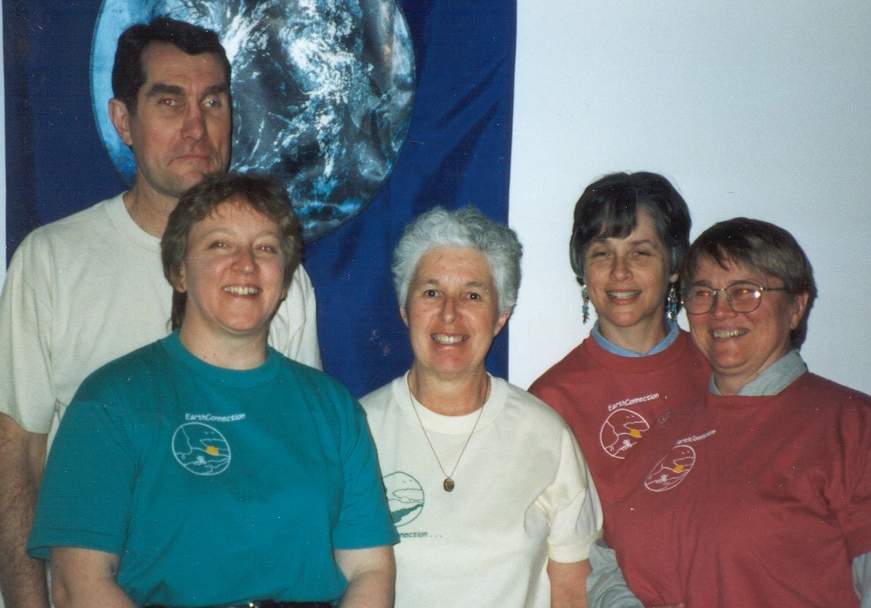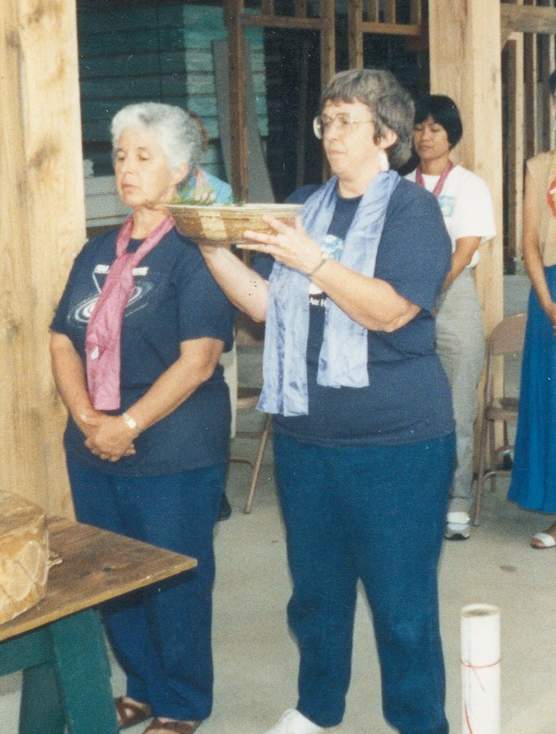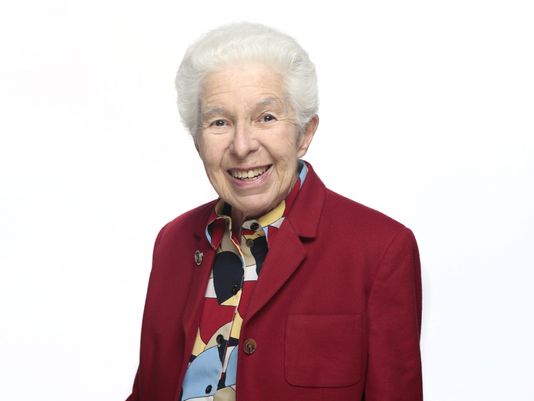By Paula Gonzalez, S.C., Ph.D.
God gave us this planet. This prayer can be our guide to saving it.
Our Father Who Art in Heaven
Except in the Temple, Jesus spoke Aramaic. In Aramaic, Father means much more than it does in English. I was amazed to learn that when Jesus said, “Father,” he actually meant, “birther of the cosmos”—a much more expansive image of the Eternal Creator! In Prayers of the Cosmos, Neil Douglas-Klotz also tells us that, in Middle Eastern thinking, heaven would actually be the “universe.”
All of creation is the vibration, the “name” which expresses divine mystery in space and time. Teilhard de Chardin recognized this so well when he said, “To those who know how to see, nothing is profane—everything is sacred.” Have we modern-day humans forgotten how to see the awesome world of which we are a part?
When we proclaim God’s name as “hallowed” (holy), do we recognize the echo of God’s name in the wonder all around us? Might God be calling us to be co-creators of a transformed Earth, a heaven of peace and harmony?
In our times we are blessed with the fact that science is constantly uncovering truths about our magnificent planet. Much is being written about “the New Story,” an understanding of the created universe as God’s 13.7-billion-year drama: creation.
No longer is the universe seen as finished, with the sun, stars and planets in unchanging orbits, but as an expanding process of which we are apart. Scientifically, it has become quite clear that God has chosen an evolutionary mode of expressing divine mystery.
This story, as told from a theological perspective, can be interpreted as “the unfolding presence of God within the universe,” says Dominican theologian Cletus Wessels. Haven’t we all been saying this since our childhood catechism days? “Where is God? God is everywhere.” But have we really believed this?
If we learn to see more clearly through the eyes of faith, assisted by what scientists discover, we can contemplate “the Word of God being made flesh in space and time”.
Thy ‘Kin-dom’ Come
During the evolution of human social systems, we have seen a movement away from kingdoms to more democratic and participative forms of government. Indeed, in countries where there are still kings and queens, their roles have become increasingly ceremonial.
Perhaps, then, in our times, Jesus would pray that “kin-dom” be what we all strive toward. Thomas Berry, a Passionist priest who calls himself a “geologian” and is one of the most influential thinkers in this area, refers to our little corner of the created universe as the “Sacred Earth Community.”
Surely, such a vision would include the interdependence and collaboration of all God’s creatures, both living and non-living. This was the vision of St. Francis of Assisi. Indigenous peoples have an innate understanding of the profound wisdom of this worldview. They often end rituals with “all my relations”—a kind of “Amen” to the reality of the kinship which they experience with the natural world.
In today’s extremely competitive and materialistic world, this idea may sound utterly impossible, but our Scriptures remind us that “nothing is impossible with God.” What might happen in our troubled world if each and every one of us realized that we are being invited to be co-creators of a different future, a world of harmony, balance, and peace?
God is Spirit, so in this material world, the Eternal Creator cannot make the changes which are so necessary if life on Planet Earth is to continue. God needs us—me and you—to do this work! The actions we do become spiritual practices, modes of prayer.
Thy Will Be Done on Earth As in Heaven
What might it mean to ask that God’s will be done here on Earth just as it is in heaven? One of the most striking things about our magnificent world, studied from a scientific perspective, is the marvelous order that is evident everywhere.
From the movements of the stars and galaxies to the ecological communities in which all life forms exist, all operate according to certain laws of nature. What will it take for today’s humans to see ourselves as a part of nature, not over it?
If we saw everything around us as sacred, how would we act toward the sun, air, water, soil, animals, plants and humans? With deep reverence! St. Francis lived this way. What a contrast with the attitudes and behavior of today’s consumer-oriented societies. Pope John Paul II addressed this in his 1990 New Year’s message:
“If one looks at the regions of our planet, one realizes immediately that humanity has disappointed the divine expectation. Above all in our time, humanity has unhesitatingly devastated wooded plains and valleys, polluted the waters, deformed the Earth’s habitat, made the air unbreathable, upset the hydrogeological and atmospheric systems, blighted green spaces, implemented uncontrolled forms of industrialization, humiliating the Earth, that flowerbed that is our dwelling.”
It seems clear that we are saying “Thy will be done” with our lips, but not with our actions. Because of this, there is a growing sense of malaise around the globe. Let us listen to the opening words of the Earth Charter: “We stand at a critical moment in Earth’s history, a time when humanity must choose its future.”
This important document, which has been compiled by thousands of persons of all religious, philosophical and ethnic backgrounds, provides “values and principles for a sustainable future.”
It could be very enriching to the development of the spirituality needed in our time if Christians and other believers would study it together through the eyes of faith. It is a wonderful guide to how we earthlings could live our prayer, “Thy will be done….”
Give Us This Day Our Daily Bread
When you pray this phrase, which word do you tend to stress?
Give? Us? Daily?
I believe that, if Jesus had chosen to come and live here on Earth in our times rather than in first-century Palestine, he would be a global citizen. So, when he would pray to the Father, “Give us…,” he would be asking in the name of our 6.6 billion human sisters and brothers. Many of these are hungry and oppressed—even here in our own very rich country.
One of the reasons Jewish leaders constantly criticized Jesus was that he hung around with the everyday folks, whom most aristocrats saw as impure and below them. Jesus’ message of equality, compassion and love for all began to look dangerous to those who feared losing some of their power.
And so it continues today. Those in power in the international community, national governments, corporations, even the various faith communities do not identify with the majority of other people as sisters and brothers. How can we continue saying “Our Father” unless we increase our solidarity with every human on the planet?
Will our plea for “daily bread” continue to be only for ourselves? Do we see all of God’s living creatures as needing a place at the table? Will we continue to forget that we are dependent for our very life on the plants, animals, microbes, rivers, sun, soil, air and water? If so, we will continue to forget that we are members of the Sacred Earth Community.
Forgive Us As We Forgive
One must only scan the daily newspaper or watch the TV news to realize that humanity finds itself in what may be the most dangerous time in human history. The evidence is reported daily.
Social unrest, war, violence in the human community, climate change, drought, intense storms, melting glaciers and loss of species diversity happen across the planet. Much of the damage which is causing these conditions comes from a domination of nature, especially since the beginning of the Industrial Revolution—about the last 160 years!
If we did an examination of conscience about our ecological sins, most of us would be alarmed to find that we Americans are using six times as much as Earth can provide over the long term.
This is what Mathis Wackernagel and William Rees report in their sobering book Our Ecological Footprint: Reducing Human Impact on the Earth. They calculate the resources needed to sustain the consumption and waste disposal of different lifestyles and state them in acres.
Earth’s “ecological capacity” is 5.3 acres per person (decreasing each year as new people join the human community). The average U.S. footprint (31 acres per person) contrasts dramatically even with that of Europeans (15 on average), making it clear that the rich world lives at levels three to six times what Earth can afford.
But how can this be? Obviously, it is only because the footprints of countries in the developing world are so low. Think of India, which has over one billion people (nearly one-sixth of Earth’s population), where the average footprint is only two acres. Knowledge of these disparities is awakening movements toward ecojustice all over the planet. Clearly, this should be a mandate for anyone who wants to be called Christian.
The cover of Radical Grace—the newsletter of Richard Rohr’s Center for Action and Contemplation—states this challenge clearly: “Most of us would like to see the poor get more. It comes as a shock to realize this will require that we take less.”
Lead Us Not Into Temptation
Surely God would never lead us into temptation. It helps to realize that the more accurate Aramaic sense is, “Don’t let us be seduced by the appearance of….” In our frenzied efforts toward progress, many of us have succumbed to the values of our world today: prestige, money and “the American dream.”
This is a virtually luxurious lifestyle when compared with that of so many of our human sisters and brothers around the world—and one which the planet cannot afford. If all 6.6 billion humans today lived with the average lifestyle of U.S. and Canadian citizens, we would need three more Planet Earths.
A dangerous response to facts like this is denial. It is tempting to entertain feelings of helplessness and even despair. All such reactions are expressive of a lack of hope, surely not a stance which should characterize sincere followers of Jesus!
What we should realize is that we are being called to act like societies of adults, truly to live our Confirmation. Possibly the most important characteristic of an adult person is a sense of responsibility. The Earth Charter reminds us that “as the world becomes increasingly interdependent and fragile, the future at once holds great peril and great promise.”
We need to see that the glass is half full and spread that attitude! We must develop what I call “roll-up-your sleeves” hope. Every day, along with the societal, political and ecological bad news, there are growing movements inviting folks to create alternatives.
Energy efficiency, wind turbines, solar panels, hybrid cars, food grown organically and locally, “green” building, ever-increasing recycling, eco-communities, nonprofit organizations tackling difficult situations both here and across the planet are alive and well. We need to pray that we will not be led into the
Pondering this in 1981 led me to “reduce my footprint” by converting an old chicken barn on our motherhouse grounds into a passive-solar, superinsulated house called La Casa del Sol (house of the sun). Volunteer help and reused materials made this possible at a tiny fraction of the cost of regular construction.
On sunny spring and fall days, radiant energy pours in through the glassy sunspace. For cloudy winter days, we use another form of solar energy: wood! Ten years later a garage became Earth-Connection, “a center for learning and reflection about living lightly on Earth.”
This solar-assisted geothermal building is heated with last summer’s sunshine which is stored deep in the ground around the building. Also, some of the power for this all-electric building is provided by solar cells (PVs) which convert sunshine directly to electricity. It’s amazing what can be done!
Deliver Us From Evil
Again, the Aramaic gives us a fascinating way to consider the term “evil.” This word might be translated as “unripeness” or “inappropriate action.” As we agree to join God as co-creators, it is empowering to know that each of us—and the communities to which we belong—will have the grace and strength to choose to ripen.
We can then enthusiastically and energetically make the appropriate efforts which can move humanity to design a world of justice, peace, and ecological harmony. A couple of tips to keep you from being overwhelmed by the enormity of the task:
- Realize that you can make a difference.
- Commit your energies to one area of Earth-healing.
- Pray to know which area God is calling you to adopt. Then find the groups or organizations that are doing this work and join them.
Why did I get into solar remodeling? Because I realized that continued use of coal, oil and natural gas could eventually destroy all life on this planet. I got involved because so many of my sisters and brothers throughout the world are living at subhuman levels. I truly believe Jesus when he says, “I came so that they might have life and have it more abundantly” (John 10:10).
As we join God as co-creators, we will find ourselves developing an integrative, contemplative spirituality which includes all our efforts as acts of worship. With St. Paul we can learn to “pray without ceasing” (1 Thessalonians 5:17).
The closing words of the Earth Charter could become our anthem as we move toward a more hopeful future: “Let ours be a time remembered for the awakening of a new reverence for life, the firm resolve to achieve sustainability, the quickening of the struggle for justice and peace, and the joyful celebration of life.”



